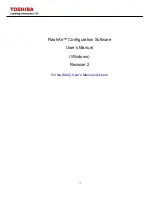
Using Telnet
ExtremeWare XOS 11.3 Concepts Guide
67
To configure the virtual router from which you receive a Telnet request, use the following command:
configure telnet vr [all | default | <vr_name>]
To change the default TCP port number, use the following command:
configure telnet port [<portno> | default]
The range for the port number is 1 through 65535. The following TCP port numbers are reserved and
cannot be used for Telnet connections: 22, 80, and 1023. If you attempt to configure a reserved port, the
switch displays an error message.
Using ACLs to Control Telnet Access
By default, Telnet services are enabled on the switch. You can restrict Telnet access by using an access
control list (ACL) and implementing an ACL policy. You configure an ACL policy to permit or deny a
specific list of IP addresses and subnet masks for the Telnet port.
There are two methods to load ACL policies to the switch:
●
Use the
edit policy
command to launch a VI-like editor on the switch. You can create the policy
directly on the switch.
●
Use the
tftp
command to transfer a policy that you created using a text editor on another system to
the switch.
For more information about creating and implementing ACLs and policies, see, see
Chapter 12
, “
Policy
Manager
” and
Chapter 13
, “
Access Lists (ACLs)
.”
Sample ACL Policies.
The following are sample policies that you can apply to restrict Telnet access.
In the following example named MyAccessProfile.pol, the switch permits connections from the subnet
10.203.133.0/24 and denies connections from all other addresses:
MyAccessProfile.pol
Entry AllowTheseSubnets {
if {
source-address 10.203.133.0 /24;
}
then
{
permit;
}
}
In the following example named MyAccessProfile_2.pol, the switch does not permit connections from
the subnet 10.203.133.0/24 but accepts connections from all other addresses:
MyAccessProfile_2.pol
Entry dontAllowTheseSubnets {
if {
source-address 10.203.133.0 /24;
}
then
{
deny;
Summary of Contents for ExtremeWare XOS 11.3
Page 20: ...Contents ExtremeWare XOS 11 3 Concepts Guide 20...
Page 25: ...1 Using ExtremeWare XOS...
Page 26: ......
Page 38: ...ExtremeWare XOS Overview ExtremeWare XOS 11 3 Concepts Guide 38...
Page 58: ...Accessing the Switch ExtremeWare XOS 11 3 Concepts Guide 58...
Page 146: ...Configuring Slots and Ports on a Switch ExtremeWare XOS 11 3 Concepts Guide 146...
Page 218: ...Status Monitoring and Statistics ExtremeWare XOS 11 3 Concepts Guide 218...
Page 240: ...Virtual LANs ExtremeWare XOS 11 3 Concepts Guide 240...
Page 248: ...Virtual Routers ExtremeWare XOS 11 3 Concepts Guide 248...
Page 278: ...Access Lists ACLs ExtremeWare XOS 11 3 Concepts Guide 278...
Page 288: ...Routing Policies ExtremeWare XOS 11 3 Concepts Guide 288 entry deny_rest if then deny...
Page 344: ...Security ExtremeWare XOS 11 3 Concepts Guide 344...
Page 393: ...2 Using Switching and Routing Protocols...
Page 394: ......
Page 454: ...Spanning Tree Protocol ExtremeWare XOS 11 3 Concepts Guide 454...
Page 484: ...Extreme Standby Router Protocol ExtremeWare XOS 11 3 Concepts Guide 484...
Page 514: ...IPv4 Unicast Routing ExtremeWare XOS 11 3 Concepts Guide 514...
Page 530: ...IPv6 Unicast Routing ExtremeWare XOS 11 3 Concepts Guide 530...
Page 538: ...RIP ExtremeWare XOS 11 3 Concepts Guide 538...
Page 556: ...OSPF ExtremeWare XOS 11 3 Concepts Guide 556...
Page 566: ...OSPFv3 ExtremeWare XOS 11 3 Concepts Guide 566...
Page 589: ...3 Appendixes...
Page 590: ......
Page 640: ...CNA Agent ExtremeWare XOS 11 3 Concepts Guide 640...
Page 670: ...Glossary ExtremeWare XOS 11 3 Concepts Guide 670...
Page 698: ...Index ExtremeWare XOS 11 3 Concepts Guide 698...
















































